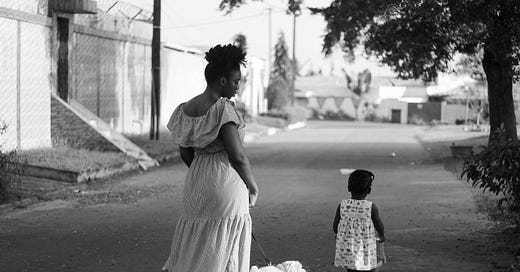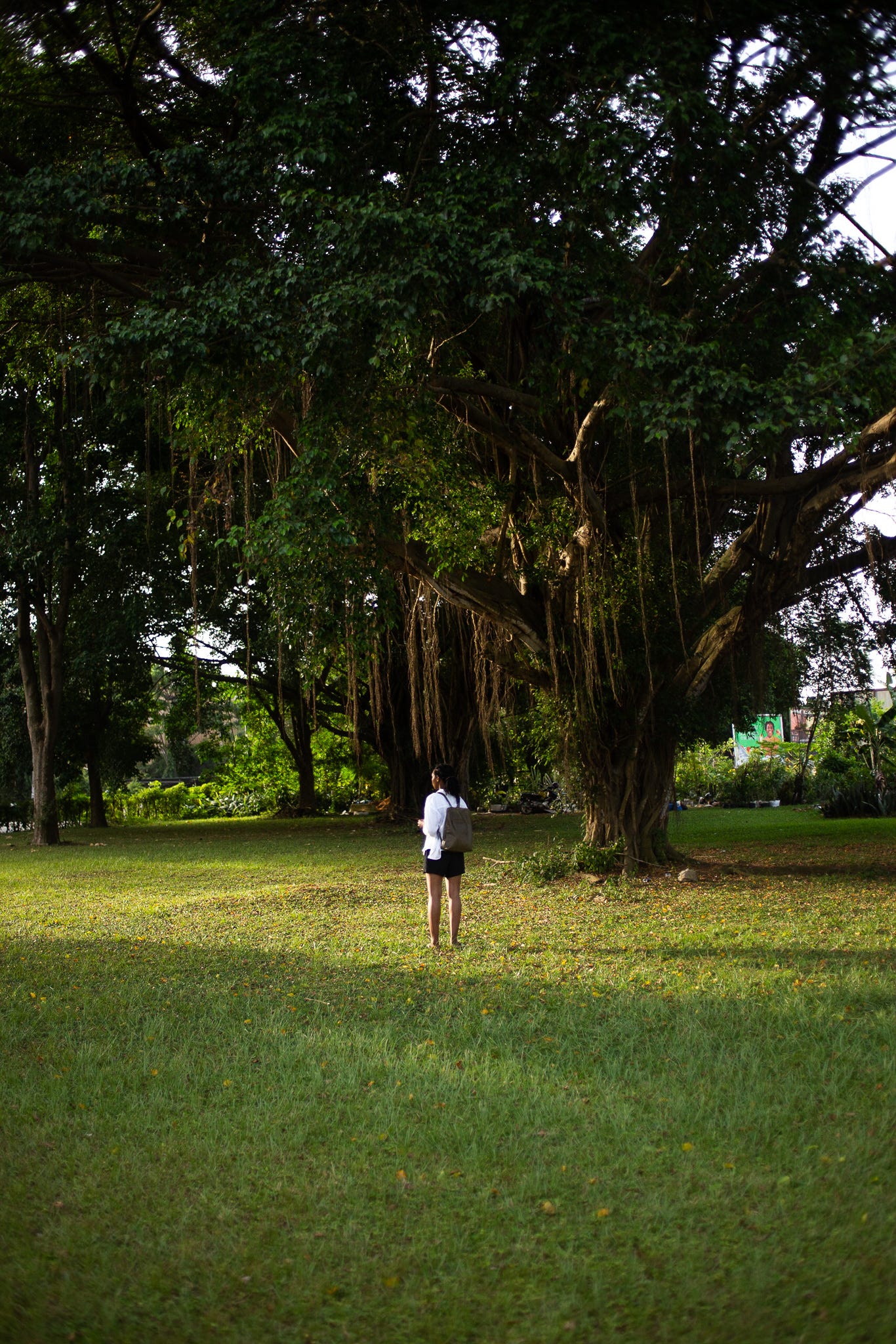I look into the frame, and consider the length of the road. Much of the distance between the foreground and background—between the pedestrians and terrain yet to be covered—is out of focus, including the fenced enclaves and the rising or sloping foliage. The right foot of a child inclines onwards, her gait assured by a mere year or less of walking. A woman is behind her. A leashed dog with a raised paw is posed a short distance from the child. If the dog and child with their raised paw and leg seem assured, the woman is counterpoised with planted feet. Her lips sulky, her head bowed, her pose worried. A spray of leaves litter the ground, like confetti arrayed in celebration of those who seek comfort in the enclose of a solitary road.
Hady Barry: “I turned to photography to interrogate and soothe myself.”
This image was made in Abidjan, Côte d’Ivoire.
The photograph was taken on an afternoon walk around my old neighborhood. In the summer of 2020 I was living with a close friend of mine (that's Azi) and her growing family: her husband (Yannick), their two-year old daughter (Adjéla), and their dog (Nana). We would sometimes go out for walks in the afternoon when the sun was more forgiving. That afternoon Adjéla was quite keen to push around her stroller. It had been a while since I had my camera. I was still learning how to balance the ISO, the aperture, etc. I was learning to “walk” again. During our stroll I just kept a few steps back and fixed in time moments and interactions between Azi and her daughter Adjéla I found interesting or telling – maybe more telling about me than them.
I adore this photograph because of how unguarded my friend Azi (the adult) is. Her head is bent down and she's completely lost in thought. She's entirely open and vulnerable. At the time the photograph was taken she was in the first trimester of her pregnancy. It was a challenging time for her and you can feel in the image how insular she seems. She is walking her dog and her daughter is by her side but she isn't fully present. She's entirely absorbed by her thoughts. Whenever I saw my friend in these moments throughout her pregnancy I couldn't help but think how lonely carrying a child is in addition to being taxing on your body. I realized that the prospect of pregnancy mostly triggered fear in me.
This image is one of the very first ones I took when I decided I wanted to invest in photography as an artistic practice. For someone who was slowly daring to call herself a photographer and an artist I was pleased by how it turned and relieved to see that I could trust my instincts.
I would say that I turned to photography to interrogate and soothe myself. This has made my work first and foremost introspective and deeply contemplative. My visual language and my practice are still evolving but what has been constant so far are: (1) a focus on starting with what is within, and (2) execution of ideas through a collaborative approach. All my projects have so far involved a conversation and a dialogue with someone else and I’d like to preserve that as I grow. The last thing I want is for my work to be extractive.
Photography tells us about ourselves and others. It is a wonderful tool and medium to uncover and highlight what connects us. It brings you closer to people and confronts you with problematics in a way that requires active engagement. A photograph fixes a moment in time and as a result there are blanks that the viewer is left having to fill in themselves.
Two more photographs by Hady Barry
For each week’s feature, I send 3 photographs to the photographer, and ask them to respond to one. Here are the 2 other photographs I selected from Hady’s portfolio. What do you think about any of them? You can respond as a comment below.
Last Week — Immaculata Abba
“Every Nigerian has many versions of this story threading through their lives. The photo, just like the entire collection it's from, is currently my primary metaphor for what living is like under Nigeria: so much else could be happening, and we are constantly mocked by it.
My approach to photography is to pay attention to the dignity, complexity and history that enable us to imagine more beauty, care and capacity in our lives.
Among many ways photography is impactful, here's one: beauty, which photography propagates, convinces so many of us, severally, to try again.”
Read “Sunrise Mill Estate”
Thank you for reading and sharing this feature on Hady Barry. You can see more of her work on her website, and Instagram. See also her work with Malala Fund and British Journal of Photography.
Every week I feature one photograph and the photographer who took it. You’ll read a short caption from me, and a statement from the photographer. My goal is to set up conversations with the work of early to mid-career African photographers. You can support the newsletter by asking anyone—or 10 people!—interested in the impact and meanings of photography to subscribe.








Your posts are having a profound impact on me. Several years ago I ventured more heavily into audio books and began to read and write less. I’ve set an intention to return to written work. You’re reminding me how beautiful words are, and how poetic language can be. I’m reflecting on my own carelessness of word choice at different times, which is inspiring me to be better. I love how your post inspired another to think of a piece of work with more beautiful words, it’s a lovely domino effect you’re having. I appreciate your work and thankful you’re choosing to share.
The photo of a person in the midst of a field reminds me of being lost in awe of nature. The human, a small part of a big field. Lost. My brain associates it with poem I just reread again where Christopher Okigbo says -BEFORE YOU, my mother Idoto,
Naked I stand;
Before your weary presence,
A prodigal
Leaning on an oilbean,
Lost in your legend
Under your power wait I
On barefoot.
I of course associate it with being lost in the awe of my first spring. Lost being a good thing in this context.